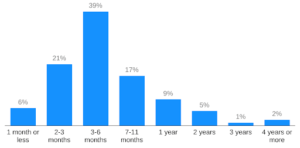- Finder's First Home Buyers report reveals 1 in 3 Australian first home buyers exceed their budget
- High property prices, competitive market, and agent underquoting all factors, says Sarah Megginson
- 39% of first home buyers spend 3-6 months on home buying process, while 1 in 5 spend more than a year
More than a third of Australian first home buyers have been revealed to exceed their budget during the purchase of their first home.
The findings were unveiled in Finder‘s First Home Buyer Report, which surveyed 1,001 first home buyers including 372 of whom had already purchased their property.
8% of first home buyers admitted that the price they paid exceeded their budget by more than $100,000. A further 8% paid between $50,000 and $100,000 over intended price, while only 20% of first home buyers successfully stayed below budget.
Eastern states buyers blowing the budget
Sarah Megginson, money expert at Finder, attributed part of the problem to the underquoting of properties – the illegal practice of listing properties at a lower price than their actual worth.
“It’s illegal but it does happen, particularly in the case of auctions, where underquoted prices can attract more buyers and lead to a bidding war.
“The agent is responsible for proving that the property is worth its listed price and for advising you if that estimate changes,” said Ms Megginson.
Blowing their budget was most common in first home buyers from New South Wales, with 41% of them exceeding what they intended to spend. 40% of Queenslanders and 31% of Victorians admitted to the same.
Finder suggests underquoting plays a vital role in this trend, with data indicating some agents in New South Wales and Victoria underquote by up to 20-30%.
How much over your budget did you (and your co-buyers) pay for your property?
| Less than $10,000 | 5% |
| $10,000-$20,000 | 8% |
| $20,001-$50,000 | 8% |
| $50,001-$100,000 | 8% |
| $100,001-$150,000 | 4% |
| More than $150,000 | 5% |
| I purchased at my budget | 43% |
| I purchased below my budget | 20% |
“We’re in a market where prices have skyrocketed and wages can’t keep up with that level of growth.
“Unfortunately this will have consequences down the track on buyers’ ability to service their loans,” said Ms Megginson.
Not all hope is lost however, as buyers are advised to better stick to their budget by keeping an open mind during their search.
“It might seem impossible to find a home within your budget, but if you expand your location filters or look for a unit instead of a house, you can bring down the cost,” added Ms Megginson.
Men and Gen Z named the speediest buyers
The 2022 First Home Buyer Report also investigated the length of time homebuyers spend on their first home search, uncovering that nearly 1 in 5 spend a year or more.
8% of buyers spend 2 years or more on the process, while this figure increases to 17% of Generation X buyers.
Ms Megginson said the hotly competitive market conditions, brought about by a lack of supply, may be daunting for some buyers.
“The market is cooling and competition is easing off slightly, but it can still be daunting to go to inspections and auctions where you have several interested buyers,”
Sarah Megginson, Finder money expert
In order to avoid splurging, Ms Megginson advises careful consideration of a purchase before signing anything.
“It’s a house, not a pair of pants – so you have to really make sure it fits before you sign.
“You’ll be stuck with it for a while, and you don’t want buyer’s remorse to sink in after it’s too late,” she added.
Time spent on home buying process from initial search to purchase

In a survey conducted by Finder, 2 in 5 first home buyers were found to spend between 3 and 6 months on the home buying process, while a quarter spent 3 months or less.
For 17% of first home buyers however, this process took over a year with 2% of respondents indicating their search went for 4 years or more.
Women (22%) were more likely than men (13%) to spend over a year on the process, while gen z were named the fastest buyers with 30% taking 3 months or less. In comparison, 28% of millennial buyers and 17% of gen x buyers spent less than 3 months from search to purchase.
In this fast-paced market, Ms Megginson advises buyers to increase their chances of success by getting pre-approval.
“With pre-approval, you’ll be considered a preferred buyer. It will also shorten the time to approval once you’ve found a property.
“Remember that most pre-approvals only last 3 months, so if you haven’t found a property by then you’ll likely need to apply for another one,” she concluded.








